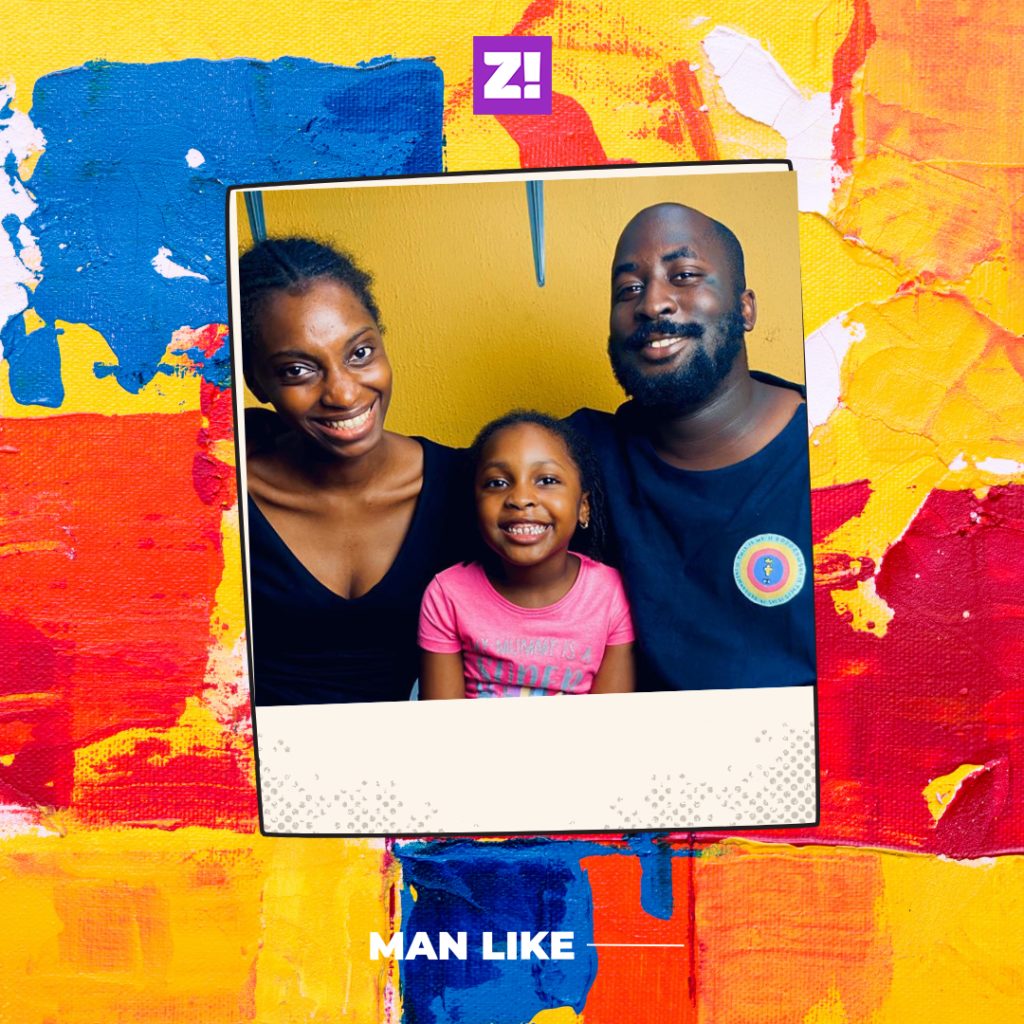What does it mean to be a man? Surely, it’s not one thing. It’s a series of little moments that add up. Man Like is a weekly Zikoko series documenting these moments to see how it adds up. It’s a series for men by men, talking about men’s issues. We try to understand what it means to “be a man” from the perspective of the subject of the week.
This week’s Man Like is Dare Aderinokun, a 34-year-old Nigerian man who went from being a banker to a bartender. He talks about making this career switch, his impostor syndrome and internal conflict around being the provider and how this change is improving his relationship with his kids.

What was growing up like?
Growing up, I didn’t want to be in the corporate world. My father thought it would be a good idea for me to learn to code while I was in university in Alabama, USA. There was a telecommunication boom in Nigeria at the time, so I added a computer major to my course. Unfortunately, I was bad at coding. I decided to go with marketing instead, which made me spend five years in university instead of three.
When I arrived back in Nigeria, I was offered an entry-level spot in one of Nigeria’s top banks, and when I was asked which department I wanted to work in, I said “marketing”, without hesitation. I quickly found out that marketing in America was very different from marketing in Nigeria, which involved more sales than marketing rather than brand strategy, customer classification and fancy stuff like that. In Nigeria, marketing just meant meeting your targets every month, without much thought to fancy ideals. Nine years quickly went by, and when I looked back at them, I couldn’t say I felt any satisfaction working in the bank. It felt like I was trying to survive, month after month, target after target. My life was in fast-forward, and I wasn’t being my true self..

So you weren’t really interested in the corporate world.
Yeah. Even when I moved back to Nigeria, my social circle was in the arts scene — film directors, music producers. I didn’t really think of wealth as something I had to accumulate, but working in banking kinda puts you in that headspace 24/7. You start and end the day talking about other people’s money and how you can grow it. I was uninterested, but I’d wear that personality in the office. I was driven by a sense of duty to provide for my family just like my dad, who did whatever he had to do to keep us comfortable. It made me money but I didn’t feel fulfilled.
So you went from banking to bartending. How did that happen?
I had my first drink when I was 13, and drinking and alcohol stuck with me. In my adult life, I found out that I liked drinking. People tend to associate drinking with social activities like going to a bar or a club, but I’m an introverted person that likes to create my own comforts at home. I didn’t exactly enjoy doing those things. I discovered that I loved creating cocktails and coming up with new recipes for drinks. So I spent my spare time online finding new recipes to try out. Before I knew it, I had amassed a collection of gin and whiskey in my house.
I started inviting people from my office and my wife’s large family over to my house on weekends to try out my cocktails. It was so much fun watching people drink and go, “Wow, this is amazing.” At first, I thought they were just being nice because I was giving them free drinks, but more people began to share their opinions. My sister, who’s a baker, joined me in mixing cocktails and it appeared she had a knack for it as well. She’s good at extracting and substituting flavours in cocktails, which is important because you can’t always find all the cocktail ingredients here in Nigeria.

When did you start considering quitting your job?
I was 32 and people were telling me that I could make a business out of making cocktails, but there was nobody I could reference as being a reputable bartender in Nigeria. I started toying with the idea of quitting my bank job to start making cocktails. It seemed crazy at first. I reasoned that if I stayed in the banking industry, I’d make a senior management position within ten years. On the other hand, there wasn’t a career path for making cocktails.
In 2019, my sister-in-law who ran a catering outfit came to visit, and I offered her a cocktail as I did to everyone. She fell in love with it and set up a kind of cocktail interview with her business partner. They asked me for different drinks, which I made without thinking much about it. They spoke between themselves and asked if I would like to serve at an event they were catering at.
I was scared as hell. Here I was, a suit-wearing banker with no real bartending experience who didn’t like social activities and basically learned how to mix drinks on YouTube. The imposter syndrome was very strong then. To be honest, it still is.
At the party, I found out that I enjoyed mixing drinks for people, and I had a lot of fun doing it. From there, a senior executive from an oil and gas company reached out to my sister and me to make cocktails at their year-end party. I thought I had hit the big time because oil and gas companies were reputed to pay well. My sister and I decided to register a company. We named it Quacktails as an inside joke, because “quack” means a fake, and neither of us was formally trained. That’s how Quacktails came to be.
Unfortunately, it turned out the company had spent the entire party budget on bringing musicians, so they ended up offering peanuts to us. It wasn’t even a sizable fraction of my salary. We turned it down. Meanwhile, my wife was blazing trails at her bank job, getting promotions and commendations. I was doubtful about leaving my job for this, afraid that I would be unable to provide for my family. I went back to focusing on my job. However, more people started to call us to make drinks for their events and business began to grow steadily.
Then COVID happened.
Ah, COVID.
On the contrary, the lockdown was great for business. People were holed up in their houses with nothing to do and bored out of their minds. We started selling cocktails in small pouches we bought online so people anywhere in Lagos could order drinks from us. Steadily, we made more and more orders every week. We started getting reviews on social media, and before we knew it, our clientele grew. My house became an on-the-go bar. My wife, who has never had a drop of alcohol, also joined in making the cocktails. Legend is, she makes one of the best margaritas in Lagos.
For the first time in a while, I felt alive. I wasn’t going through a brain-numbing ritual of suiting up to go to work to do the same old job, presenting on PowerPoint, poring over some boring documents every day. I had time with all my spirits and flavours and was discovering new tastes and drinks. The more time I spent at home, the less inclined I was to go back to working at the bank. I got to spend time with my family and didn’t have to go out. It was bliss.
What happened after the lockdown?
We went back to our day jobs. Only, this time, my phone was blowing up with orders. Even my co-workers who didn’t know it was my business ordered regularly. I was thinking, “What the hell is going on?” I thought it was going to die down but it only got bigger. I spent my lunch break checking through messages and sorting orders. I became a bartender and a banker at the same time. I was making my entire month’s salary in just a week of running the business. I became conflicted because I wasn’t sure what to do. Obviously, being the managing director in a bank beats being a bartender but at the same time, I had found new energy in doing stuff I liked. I could also support causes I wanted, which was a major issue with the bank where I risked losing my job for participating in the EndSARS protests. I didn’t support the organisation’s values and running my own business meant I would be able to speak on issues that are important to me.
I finally quit my job at the bank in March 2021. I was making my salary’s equivalent from a couple of days of business, all from the comfort of my home. Sometimes, I have doubts, but the sense of fulfilment I get from making cocktails is unmatched. I didn’t want to be driven by profit all my life as an MD of a bank.
Omo. What did your wife think of your resignation?
She actually celebrated it. Far from considering me a failure, she knew I didn’t really enjoy my job and was glad I was following my passion.

How do you feel about your decision now?
It’s awesome being able to wake up when you want to and spend time with your family. I barely used to have any time to spend with my kids because I was always out early and back late. Now, I wouldn’t trade the time I spend with my children for anything else in the world. There’s no pressure to be the most profitable department, neither am I chasing crazy targets.
I’m not driven by profit. I just want to run an organisation that stands for people and the community. My dad however was not pleased, at first. My uncle, rest his soul, was a founding member of the bank where I worked and my dad had hoped to keep his brother’s name alive. Then again, he came from a different time where providing was a man’s most important duty and all the talk about passion and interest sounds like nonsense to him. Now, my parents are supportive but they weren’t always.
What’s it like being a father, especially now that you’ve quit your job?
My first kid is six and the second is two. My purpose changed when they were born. I stopped focusing on enjoying life and started focusing on how to be a provider for my kids. My parents did a decent job of keeping us comfortable and I wanted to be able to do more as a father.

Now, our relationship has improved. They’re happy to see me more often. I’m glad I’m able to nurture a relationship with them which I couldn’t have done while working at the bank. To them, I’d probably still be that grumpy man that comes back home every evening in a suit in a bad mood. I’m grateful for that. We have a great time watching cartoons together and that gives me a sense of being involved. Providing for your kids isn’t just the money you’re bringing, it’s also your time and attention.
How does having a family conflict with your need for your own space?
It’s tough sometimes. Sometimes I just want to mute everything around me, if I’m being honest. I’ve also created my own space where I can always go to be a recluse. Not to say I don’t love being around my kids — they’re the best things in my life.
What’s your biggest fear as a father?
There are many fears that come with fatherhood but my biggest fear is waking up one day and being unable to provide for my family. My wife is an industrious hard worker and I know that if at any point, I become unable to provide, she’ll pick up easily but it’s still a fear that always nags at me. With every weekend, I feel like that’s the weekend I wouldn’t get any orders and it would mean the failure of my business. I’m afraid people are going to wake up one day and think, “these cocktails are rubbish” and they wouldn’t order anymore. I still receive offers from competing banks but I don’t think I’m going back to a life of not being myself. I don’t want that anymore.
Check back every Sunday by 12 pm for new stories in the Man Like series. If you’d like to be featured or you know anyone that would be perfect for this, kindly send an email.
Are you a man who would like to be interviewed for a Zikoko article? Fill this form and we’ll be in your inbox quicker than you can say “Man Dem.”




